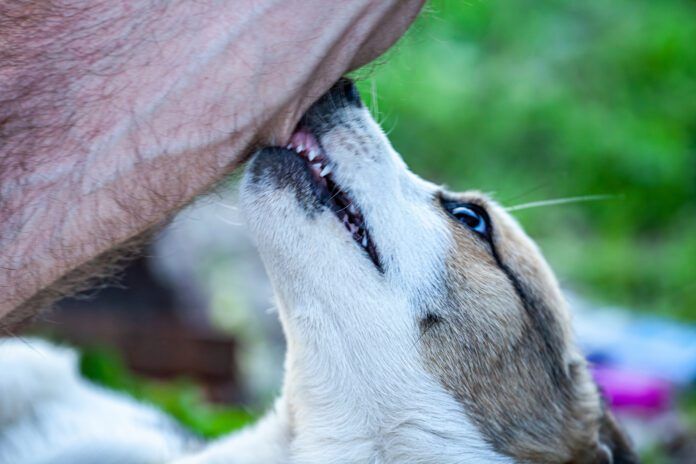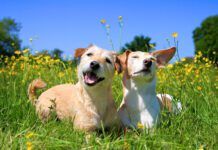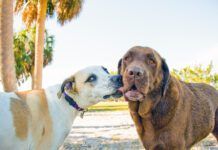Nibbling, or “cobbing,” refers to a dog gently chewing with his front teeth. The term cobbing may have been coined because the dog’s nibbling resembles a human nibbling on a corn cob. Dogs have been known to do this to their owners, other humans, other animals, themselves, and toys. Let’s explore the many reasons for cobbing in dogs. I asked this question of both fellow trainers and just plain dog parents and received a lot of input on why dogs cob.
Why Do Dogs “Cobb”?
Expressing Affection: Many dogs seem to enjoy greeting their humans by gently nibbling on arms or hands. Dogs might nibble you when the human is scratching the exact spot on the dog’s body that gives them the most pleasure. It’s a happy relationship connection when done in these contexts. Cobbing can also often be directed at housemates when relaxing together, in what appears to be a way to affectionately reconnect. Stories from dog parent friends include tales of their dogs cobbing their best feline friend in this manner as well as their best canine friend. My puppy seems to do it to his older “sister” out of affection and when he wants to play.
Part of Play: Dogs frequently nibble each other as part of play. My giant breed puppy gently nibbles up and down the side of my Chow’s body to invite play. It’s amusing to watch. There are often some grunting and snuffling sounds that are included in this activity as well as wide grins with lolling tongues between cobbs.
Communication: Some dogs use cobbing to calm a canine housemate when they seem to be annoyed. It’s usually well received and works quickly and easily. Cobbing in this context is often focused on the side of the face and quite brief.
Grooming: Cobbing is often part of grooming other animal housemates in the home. This can be separate from simple affection shown or included with such, but grooming is the added feature here.
Teething: Puppies do this when they are teething to relieve dental pain. As the puppy finds it soothing in this context, I think the emotions from the soothing remain even after teething pain is gone, so the older puppy or dog continues cobbing.
When Dogs Cobbing May Be a Problem
Cobbing may be seen in other contexts that can be concerning.
Boredom: Insufficient enrichment, either mental or physical, can cause excess cobbing. It may be directed at humans in the home, other animals, or even inanimate objects such as pillows, blankets, toys, furniture, and other items that really weren’t intended for cobbing at all. This results in unhappy humans as well as unhappy dogs. If excess cobbing is causing destruction, assess the dog’s daily life. Is the dog getting sufficient physical exercise? Walks are not meant for cardio activity; they are mental enrichment. Make sure that your dog is getting a physical outlet for their level of activity needs, such as playing ball, playing with other dogs who are friends, or running loose in a safe enclosure.
Are they getting sufficient mental enrichment? This can include training games, being permitted to sniff to their heart’s content on walks, playing with you, and being given an opportunity to exercise their brain. Do they have concerns about a change in the routine? Change can cause anxiety, and the result can be cause for concern.
Anxiety and/or Stress: Cobbing on toys is normal until it isn’t. What I mean by that is if it’s seemingly self-soothing and not obsessive, it’s probably fine. If it starts happening suddenly when it isn’t already part of perhaps an evening self-soothing routine, then it’s time to examine what has changed to cause it. If it’s already part of how your dog winds down, but the intensity ramps up, look at the big picture. My puppy’s sudden ramped-up cobbing happened when he went on behavioral medication for anxiety. The dose was low for his weight, but it was too high for him. Reducing the dosage helped him go back to normal evening self-soothing cobbing that he can easily leave if something else catches his attention such as a chew bone.
Pain/Illness: Anxiety over not feeling well can accelerate cobbing. Making sure that you fully understand your dog’s normal behavioral responses is crucial to recognizing what is outside of normal. Because they cannot tell us what’s wrong, we must understand theirs to properly care for them.
Breed-Specific Cobbing
I used to rescue Dobermans. They are well known for self-soothing with pillows and/or blankets. I always made sure that mine had what we called “sucky pillows.” I have seen my dog-parent friends with other potentially higher-strung working breeds such as German Shepherds and various Belgian breeds as well as herding breeds like Border Collies also mention the strong propensity for cobbing. My puppy is a livestock-guardian breed and some of them can certainly be more prone to drama than say a Labrador or Golden Retriever. Again, this comes down to knowing your dog. Look at the whole picture to determine whether cobbing is a problem or not. Most of the time, it isn’t. I offer my puppy his favorite cobbing toys at night, and he grins at me. It’s all good.







My almost 2 yr old dog does this to her big brother. He loves it. She does it when he is getting attention from my husband or I and she isn’t. She also sucks on her toys. Not sure if this is related in dogs that do both. None of us mind her doing these things and they do seem to be self soothing. She gets lots of exercise btw and has toys, raw bone once a week and a chicken paw once or twice a week. Both go to rally training and she also does scent work so lots of enrichment!
My 10 month old GSD puppy does it to my family. It hurts and we hate it! When we get mad at him, he gets mad back and barks at us. I recognize it’s supposed to be an affectionate thing, but when he does it, he frequently pinch-bites a tiny amount of flesh and it’s Very Painful. I don’t like getting mad at him for showing affection, but so far we haven’t been able to make him stop the behavior. Any suggestions?
Try a substitute behavior. You can try teaching him to lick instead of cob if its contact with you he craves. Or you can try directing him to a toy instead. Just make sure to reward and praise when he redirects the way you want. Don’t punish him for cobbing. If he doesn’t redirect the way you want, get up and move away, removing your presence. He’ll eventually learn that if he does what you want he is rewarded and if he doesn’t he is left alone without your presence.
My 18 month old Westie does this to me when I have been away for an hour or two and return. It doesn’t feel really good. I understand this is a show of affection, but he follows close on my heels and nips. I’ve been correcting by turning around and pushing him away while I tell him no. Does anyone have any other suggestions?